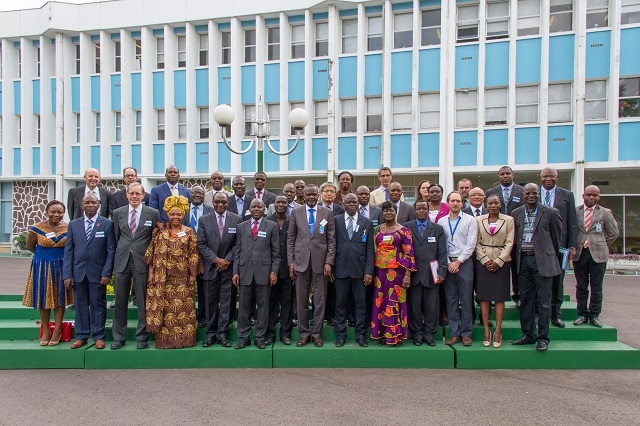WHO strengthens capacities of national blood transfusion systems in Ebola-affected countries
 Brazzaville, 2 June 2015 - The strengthening of National Blood Transfusion Systems (NBTS) has become a top priority in countries hardest hit by the Ebola virus disease (EVD). Plans are being developed in Guinea, Liberia and Sierra Leone to strengthen blood transfusion systems and ensure safe blood is available to everyone in need.
Brazzaville, 2 June 2015 - The strengthening of National Blood Transfusion Systems (NBTS) has become a top priority in countries hardest hit by the Ebola virus disease (EVD). Plans are being developed in Guinea, Liberia and Sierra Leone to strengthen blood transfusion systems and ensure safe blood is available to everyone in need.
While there is no proven treatment available, blood collected from Ebola survivors and given to Ebola patients has demonstrated promising results in small groups of EVD patients. The World Health Organization (WHO) developed guidelines on the use of convalescent whole blood (CWB) and convalescent plasma (CP) from recovered patients for transfusion to patients with early EVD as a possible treatment.
As the interest in convalescent plasma therapy grows, the WHO Regional Office for Africa is convening a follow-up meeting to strengthen NBTS in Ebola-affected countries. The meeting aims at considering how to best implement the finalized plans to strengthen NBTS in Ebola-affected countries. The meeting seeks commitment from national health authorities and international partners to allocate adequate resources for strengthening NBTS and the response to the Ebola epidemic.
Dr Matshidiso R. Moeti, WHO Regional Director for Africa, indicated in her opening speech that the meeting is taking place immediately after the adoption of WHO's report by the 68th World Health Assembly on the “2014 Ebola Virus Disease Outbreak: current context and challenges; stopping the epidemic; and preparedness in non-affected countries and regions."
The speech, read on her behalf by Dr Ossy M.J. Kasilo, Health Technologies Programme Area Coordinator, acting for the Director, Health Systems and Servicers Cluster, noted that "the Report shows that Liberia has been declared Ebola free and with a significant but variable decline in incidence of Ebola cases across Guinea and Sierra Leone, and insists on the need to maintain efforts to avoid further transmission of EVD in these countries and the risk of introduction of the disease to other countries."
Dr Moeti urged Member States to develop and or review and implement their national blood policies, strategies and plans that take into consideration the threat of the emerging and re-emerging diseases such as Ebola virus disease. She also called upon communities, heath care workers, development partners and relevant stakeholders to support Member States in their efforts to improve blood safety in the African Region.
Dr Nyankoye Haba, Director-General, NBTS of Guinea, welcomed WHO's initiative while indicating that ‘’the present meeting is an opportunity to explain the real needs of the people regarding the availability of blood and blood products.” He also expressed hope for “partners to fully commit to support countries in the implementation of the current project.
Guinea, Liberia and Sierra Leone are facing important constraints in making safe blood and blood products available for all patients. These constraints include lack of adequate infrastructure and equipment; of skilled staff for blood and plasma collection; and preparation of blood components, screening and distribution of blood and blood products. As a consequence, hospitals face acute shortage of blood for transfusion of patients, especially women and children with severe haemorrhage or acute anaemia.
The meeting in Brazzaville brings together participants who attended a previous meeting in Geneva (Switzerland) in February 2015. These participants include National Blood Programme Managers of the three EVD affected countries; as well as those sharing land borders with them (Côte d’Ivoire, The Gambia, Guinea Bissau, Mali and Senegal) and those with EVD outbreak experiences (Democratic Republic of the Congo and Nigeria) and national health authorities from these countries.
Key health partners that are attending the meeting include: the Bill and Melinda Gates Foundation, Safe Blood for Africa and Clinical Research and Management of the United States of America, among others.
Guinea, Liberia and Sierra Leone are also being supported to strengthen their NBTSs through partnerships with: the Antwerp Institute of Tropical Medicine, Belgium; the Institut Pasteur, Etablissement Français du Sang, France; University of Liverpool, University of Oxford, London School of Hygiene and Tropical Medicine, the United Kingdom; Clinical Research Management, United States of America and Médecin Sans Frontières.
__________________________________________________
For additional information, please contact:
Technical contacts:
Dr Ossy M.J. Kasilo - +47241 39268 - kasiloo [at] who.int (kasiloo[at]who[dot]int)
Dr Andre Loua - + 47241 39250 - louaa [at] who.int (louaa[at]who[dot]int)
Dr Dicky Akanmori + 47 241 39112 – akanmorib [at] who.int (akanmorib[at]who[dot]int)
Communications contacts:
Flavienne Issembe: + 47241 39352 – issembef [at] who.int (issembef[at]who[dot]int)
Dr Cory Couillard + 47241 39995 – couillardc [at] who.int (couillardc[at]who[dot]int)


